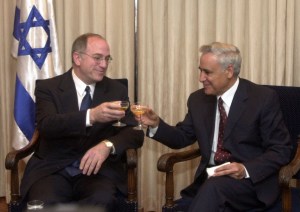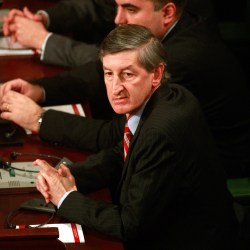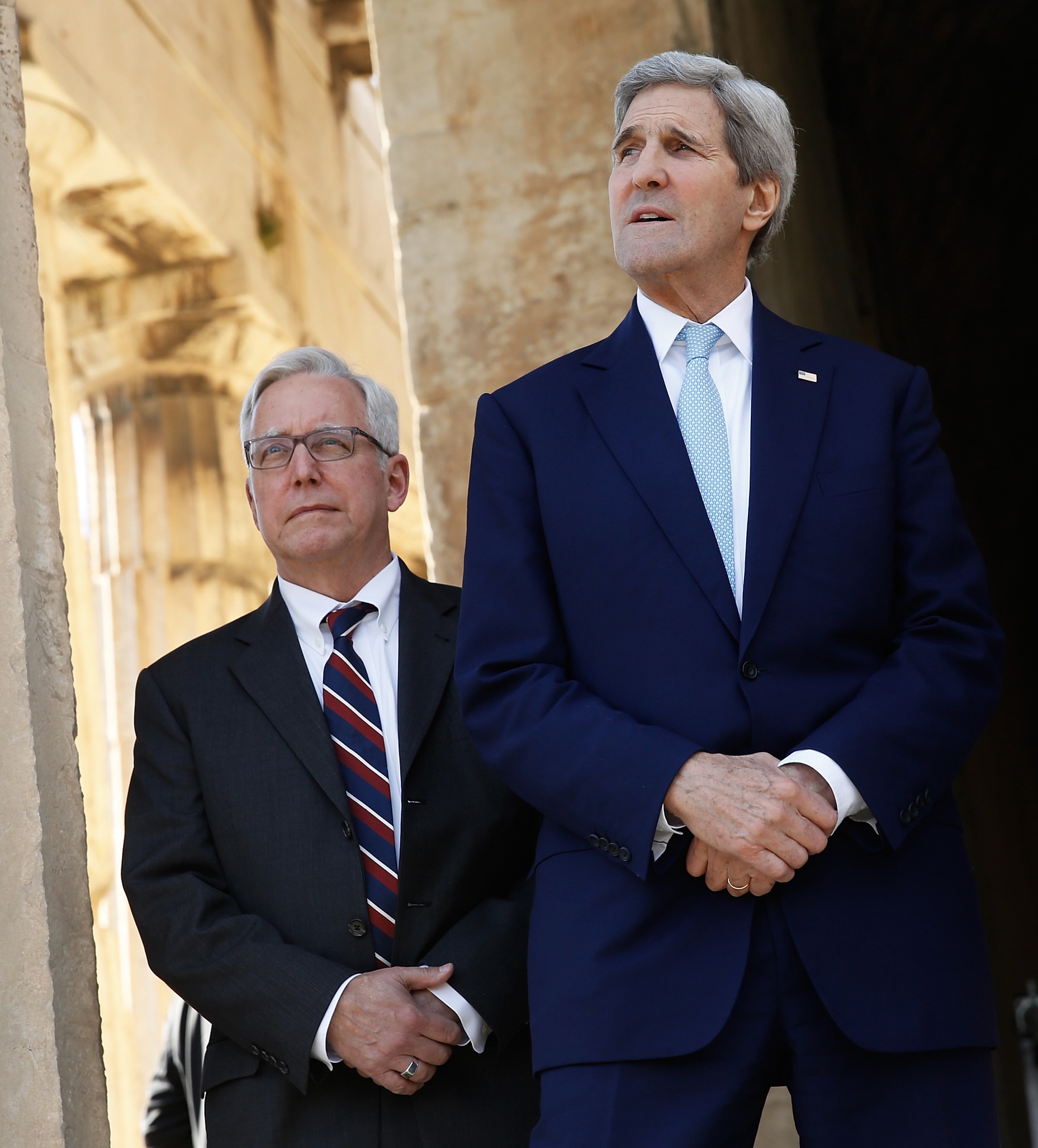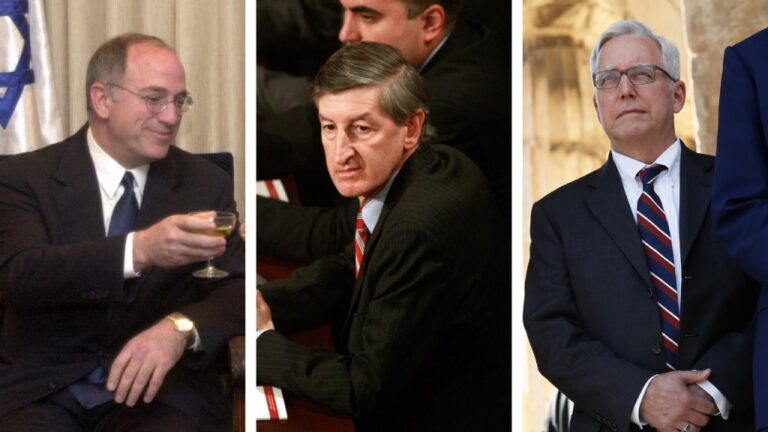When the Maine World Affairs Council began planning its Fall Foreign Policy Forum last May, organizers weren’t sure how many people would show up for a panel discussion on the legacy of American leadership in the search for peace in the Middle East.
The event would bring together three retired U.S. ambassadors who are leading experts on Middle East diplomacy, including a Maine resident who worked directly with the Palestinian Authority in the early 2000s. But even that did not guarantee a strong participation.
Now, following Hamas’ attack on Israel on October 7 and the war that followed, the council moved Wednesday’s forum to the 520-seat Hannaford Hall at the University of Southern Maine in Portland to accommodate a wider audience.
“To be honest, the Israeli-Palestinian conflict wasn’t a topic that people paid a lot of attention to,” said Allison Hodgkins, the council’s executive director. “Little did we know that the tragedy of October 7 would put this issue on everyone’s radar screen.”
The forum was also postponed until October 26 following the mass shooting in Lewiston on October 25. The forum is free and open to the public, with a welcome reception at 5:30 p.m. and a keynote address at 6:30 p.m.
The council’s goal in hosting this forum is to generate local interest in global affairs and help Mainers become aware of the impact of international events on their lives, regardless of what is covered by agencies American press.
“The United States is in a leadership position in the world and it is important that citizens understand that this conflict affects Maine people,” said Hodgkins, who has lived and worked in the Middle East for more than 20 years. She is a nonresident fellow of the Boston Consortium for Arab Region Studies and a board member of the New England Arab-American Organization.
More than 1,200 Israelis and 15,000 Palestinians have been killed since October 7, sparking protests around the world, a surge in anti-Semitic and anti-Arab incidents in the United States and major policy challenges for the Biden administration.

Daniel C. Kurtzer, then U.S. Ambassador to Israel, left, toasts with Israeli President Moshe Katsav in Jerusalem July 24, 2001. Rikard Larma/Associated Press, file
“We hope that people will come away from the forum with reason to hope that the people of the Holy Land can live in peace,” Hodgkins said. “We will have a calm and informed discussion about the issues. We’re going to come up with slogans and soundbites to understand really complex issues.
The panel will include Daniel C. Kurtzer, who served as ambassador to Egypt from 1997 to 2001 and to Israel from 2001 to 2005, capping a 29-year career in the U.S. Foreign Service. He is now professor of Middle East political studies at the School of Public and International Affairs at Princeton University.

Jacob Walles, then U.S. ambassador to Tunisia, attends a ceremony on January 27, 2014. Aimen Zine/Associated Press, file
The panel will also include Jacob “Jake” Walles, who worked in the Foreign Service for 35 years, including as consul general and head of mission in Jerusalem from 2005 to 2009 and as ambassador to Tunisia from 2012 to 2015. He is a non-profit senior fellow. -resident in the Middle East Program of the Carnegie Endowment for International Peace, where he focuses on Israeli-Palestinian issues, Tunisia and the fight against terrorism.
The panel moderator will be David D. Pearce, a Maine native and Yarmouth resident who has lived and worked in the Middle East on and off for several decades. He graduated from Cheverus High School in 1968, studied classics at Bowdoin College and earned a master’s degree in journalism from Ohio State University.
Pearce covered Lebanon’s civil war in the 1970s, then joined the State Department in 1982, where he eventually served as ambassador to Algeria from 2008 to 2011 and to Greece from 2013 to 2016. His assignments in the service foreign countries include Saudi Arabia, Tunisia, Kuwait, Dubai, Syria, Afghanistan and Jerusalem, where he served as consul general, head of mission and U.S. representative to the Palestinian Authority from 2003 to 2005 .

David Pearce, then the United States Ambassador to Greece, left and joined then-Secretary of State John Kerry on a tour of Athens on December 4, 2015. Jonathan Ernst/Pool photo via AP
The direction of Wednesday’s discussion will depend heavily on the latest news coming out of Israel, Pearce said.
“A lot will depend on what happens that day,” Pearce said. “We’ll talk about how we got here and what happens when the dust settles. Is this the moment that could finally bring peace to the region? This is a question that many people ask themselves.
Last week, Hamas released 110 hostages held in the Gaza Strip before fighting resumed on Friday; Israel released 150 Palestinian prisoners and detained almost as many others; and news broke that Israeli intelligence officials knew more than a year ago that Hamas was planning an attack, according to media reports.
The forum is co-hosted by USM’s Muskie School of Public Service, with financial support from the William S. Jelin Foundation. Jelin was a prominent Portland businessman, Jewish and advocate for Middle East peace, said Harold Pachios, a Portland attorney who represented Jelin and serves on the council’s advisory board.
Pachios said the council was fortunate to have assembled experts who have been very busy since the war began.
“These guys are on TV all the time now, speaking as experts on the Middle East,” Pachios said. “This is an opportunity to provide essential facts and insight into a problem that is not very simple.”
Walles, in a phone call from Washington, D.C., admitted that he had been frequently wiretapped in recent weeks to appear on television news programs.
“It started on October 7 and it hasn’t stopped,” he said.
Walles said it was too early to say whether this crisis could lead to lasting peace in the region. It’s a rapidly evolving conflict, he said — and one that has already forced him to rewrite his opening speech at Wednesday’s forum.
“I think a lot more bad things are going to happen,” he said.
” Previous
Related Stories



